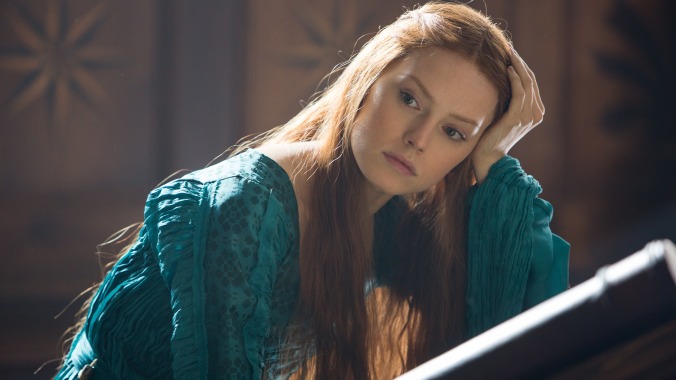Daisy Ridley is Ophelia, and Ophelia is not dead, in this bland YA gloss on Hamlet


Opening with a shot of its title character (Daisy Ridley) floating in a brook, presumably drowned (as announced by Gertrude in Act IV, Scene VII), Ophelia then has her address us in voice-over narration, speaking words that have lately become dreaded cliché: “You may think you know my story.” Well, only because it’s part of the most famous text in literary history. Reconsidering Hamlet from another viewpoint has certainly been done before—most notably in Rosencrantz And Guildenstern Are Dead—but the attempt is inherently risky; if you’re going to court comparison with the English language’s finest wordsmith, you’d better share Tom Stoppard’s rich imagination and verbal dexterity. Lisa Klein, who penned the young-adult novel from which Ophelia was adapted, doesn’t achieve that rarefied level here, and neither does screenwriter Semi Chellas (who was nominated for an Emmy for her work on Mad Men). They’ve created not a bold revision but a bland empowerment tale, devoid of everything that makes Hamlet great.
To be fair, over half an hour elapses before the movie even arrives at the events of Shakespeare’s play. We initially meet Ophelia as an inquisitive child (played by Mia Quiney) who embarrasses her father, Polonius (Dominic Mafham), by failing to remain silent and “ladylike” at court. Her spunk attracts the attention of Queen Gertrude (Naomi Watts), as yet still married to Hamlet’s dad and seemingly bored out of her mind. Gertrude installs Ophelia as one of her ladies-in-waiting, whereupon Ophelia jumps forward to the period preceding the King’s murder by Claudius (Clive Owen, seemingly bored out of his mind). These scenes serve less to broaden our notion of who Ophelia is than simply to fill in some of Hamlet’s backstory, depicting Claudius’ initial seduction of Gertrude and the ghost’s first appearance (to Ophelia). Finally, we get an ultra-condensed run through Hamlet itself, reconceived with Ophelia as its prime mover—she’s now the one who’s truly feigning madness, as well as eventually faking her own death.
That last bit borrows a plot point from Romeo And Juliet (the false poison), and Klein’s story also throws in some wholesale inventions, including Gertrude’s sort of witch-adjacent twin sister (also Naomi Watts). But it arguably gives Ridley less to play than would a straight performance of Hamlet. This Ophelia is more proactive than the Shakespearean version, but still very much circumscribed by custom; she and Hamlet (George MacKay) secretly wed midway through the film, and the primary narrative question becomes whether he’ll honor that pledge or throw it away in his quest for revenge. What had previously been a deeply perplexed young woman, struggling to cope with Hamlet’s antic disposition, gets reduced to one of those decorative screen wives who begs the male hero not to do something interesting. Even her grief over Polonius’ death barely registers, and while Ridley leans hard on generic fierceness, making Ophelia superficially stronger, she doesn’t expand the character to a degree that would merit her having taken center stage. Several major events have been rejiggered in her favor, yet she still feels subsidiary.
Director Claire McCarthy (The Waiting City) creates an occasional visual correlative to Hamlet’s verbal grandeur; her Murder Of Gonzago—the play-within-the-play that Hamlet stages in order to study Claudius’ reaction—looks magnificent, performed in shadow behind a blood-red curtain. Any formal merit, however, is undermined by the dismal language. Rather than attempt to mimic Shakespeare’s poetry—admittedly a near-impossible task—Chellas chooses to have everyone speak plainly, rewriting portions of Hamlet to match. No more does Polonius instruct Laertes (Tom “Draco Malfoy” Felton) to “beware of entrance to a quarrel; but being in, bear’t that th’ opposed may beware of thee.” Instead, he now says “And don’t fight, or if you do, win.” How painfully this contemporization strikes the ear will likely vary from viewer to viewer, though few will be able to repress a snort at Hamlet testily saying, when Ophelia unexpectedly shows up alive, “I told you to get to the nunnery!” Ophelia’s wholly invented dialogue, on the other hand, sounds very much like it came out of a young-adult novel. “You stop my heart,” Hamlet tells Ophelia during their first courtship scene. “If your heart stopped, you would die,” she correctly observes. “I seem to be quite alive,” he accurately notes in turn. It’s probably safe to say that nobody will be speaking those lines 400 years from now. Nobody may even remember them a week from now.